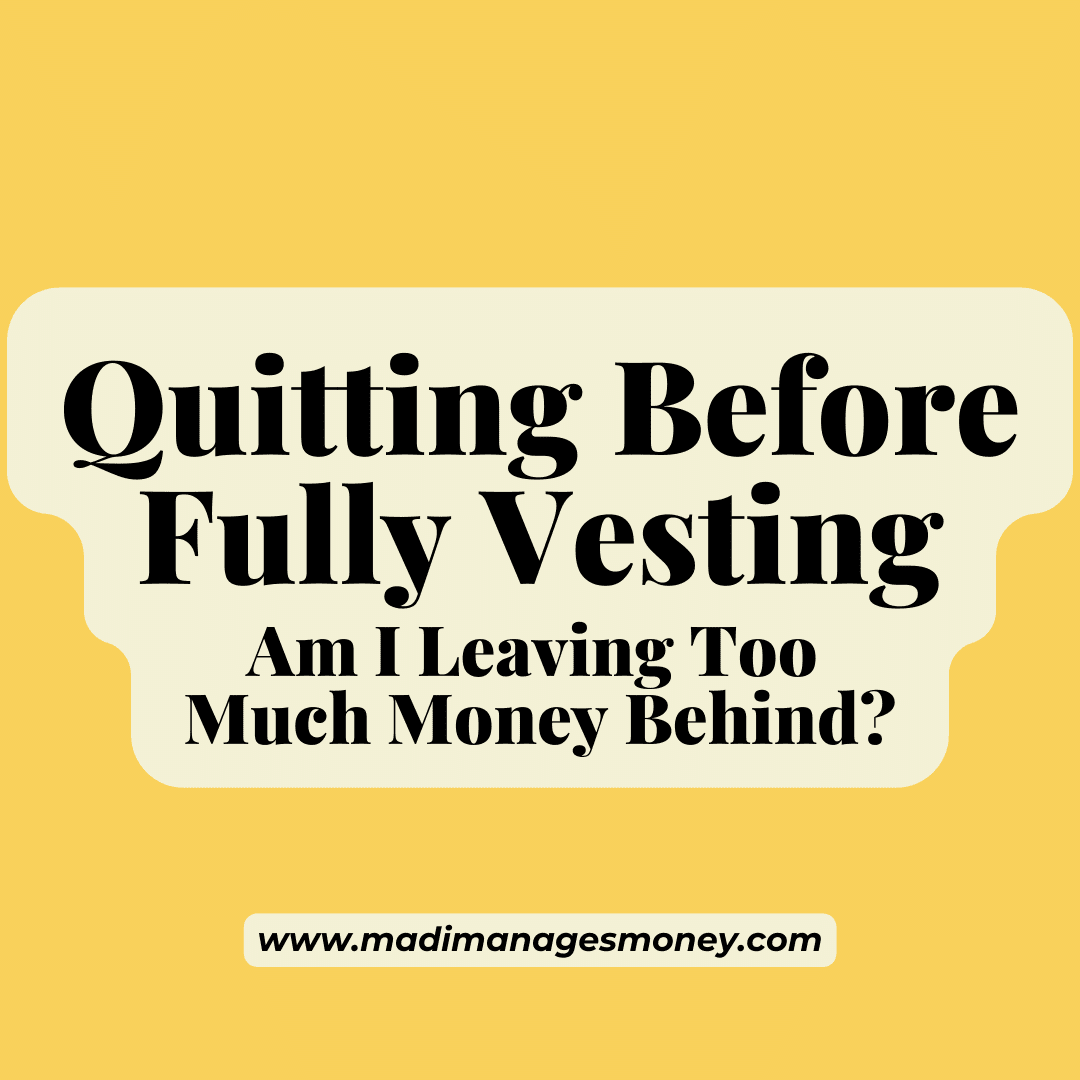Should you quit before fully vesting? Or are you walking away from too much money?
The Great Resignation is a salary-growth party, and the punch bowl keeps getting refilled. According to the Bureau of Labor Statistics, a record 47 million Americans left their jobs in 2021, and for good reason. Job-switchers saw faster wage growth than job-stayers.
Those who resigned from their jobs were disproportionately women, and I’d speculate, mothers. Many left jobs for better pay, but also for less inspiring reasons. Women cited burn-out and childcare issues among the top.
Your vesting status and milestones should be a key consideration before leaving any job. Vesting can change the amount of money you walk away with by thousands of dollars.
So what’s the move? Leave your job and forgo those unvested dollars? Or stick it out to vest? Read on to understand major factors you should consider when making your decision.
But first, what even is vesting?
If you work at a job with a retirement plan (like a 401(k)), you’ve likely been impacted by vesting. When you vest, you legally become the owner of something.
The employer match in your retirement plan is probably the first place you’ll encounter vesting. During your first few years with a company, employer matching contributions often aren’t actually yours…yet. You gotta wait it out until you vest.
(Any of your pay that you contribute, however, is always yours regardless of vesting status!)
Think of that money as sitting in a treasure chest. The treasure chest magically unlocks as you vest.
As you progress in your career, your total compensation will probably be made up of more components than just your salary. Eventually, you’re likely to be incentivized by equity compensation that is subject to vesting.
A vesting schedule determines when and how you vest. (You can find this in a document called your company’s summary plan description. Search for it on your intranet or ask HR.)
How long do I have to wait?
On average, vesting takes about three to five years, but it will depend on your specific company.
If that feels long, that’s because it is. Your employer uses vesting to incentivize you to stay in your job by dangling a future reward in front of you.
A common schedule is 3-year cliff vesting. Cliff vesting is sudden, just like it sounds. For your first three years of employment, you’re 0% vested. Then, once you hit your three-year anniversary – VOILA! – you vest fully.
A second type worth mentioning is graded vesting over four years. Each year, you’d vest incrementally by 25%. Once you reach four years, you’re 100% vested.
As an example, if you’d peace out after one year on the job, you’d be 25% vested. If you leave after three years, you’d be 75% vested.
After you reach your vesting date for your retirement plan, you did it! Time to dive like Scrooge McDuck into your pile of money, because you’re fully vested going forward.
Should I stay or should I go? The case for staying.
It’s natural to feel like unvested money isn’t real because it’s often in an inaccessible, tax-deferred account that you won’t use for decades. But let’s be clear – this is real money that you’re leaving behind. Stay and reap the rewards.
If you’re considering leaving your job, you’re probably considering a new role. That could very well be the best move for you, financially and mentally.
Keep in mind, though, that with each company change, you restart your vesting journey over again from square one. (If you’re changing jobs within your current company, you’ll maintain your vested status.)
From the vantage point of vesting, staying at your company makes sense. Remember, that once you’re vested, you stay vested on all money going forward.
I’d never recommend staying in an unhealthy job that you hate, unlessssss you’re on the cusp of fully cliff vesting in like a month and will be thousands of dollars richer.
The case for leaving.
If you’re being offered a job with a meaningfully higher wage, there’s a good chance that job-switching will be the move. Let’s look at an example with some nice round numbers in a 401(k).
Pretend you make $100,000 per year. Your current employer matches 50 cents to the dollar on the first 6% that you contribute to your 401(k). Each year, your employer contributes $3,000 to your account as an employer match.
Over a three-year cliff vesting schedule, your employer would have contributed $9,000 on your behalf, plus any market appreciation.
If you receive a job offer for even just $10,000 more, it might make sense to take it. At your new wage, you’d recoup the money you left behind by resetting at a higher baseline.
Not only are you earning more in your total pay, but you also may be receiving a match on your new, higher salary.
Lastly, if you’re at a company that you know isn’t compatible with you long-term, the sooner you find a better fit, the sooner you can vest in your new role for the long haul.
The bottom line: be aware of your vesting milestones and the amount at stake when making a decision.
For all the moms making beaucoup bucks: equity compensation
Not everyone earns equity compensation, so congratulations on having this problem in the first place. This is where things get a little more tricky.
Once you reach a certain level in your career, the composition of your total comp might change. Restricted stock units (RSUs) and options are equity compensation features for moderate- to high-earners that often require vesting.
Your company grants these to you to give you flexibility in when you realize income (for tax purposes). But, they also provide them for a more selfish reason. Company equity helps keep you around longer and aligns your efforts with the success of the firm.
Vesting of RSUs and options depends on when they were granted to you, not necessarily how long you’ve been at a company. In this way, they can differ from your retirement plan vesting.
Even if you’ve worked for your company for a decade, you more than likely won’t be vested in these immediately when you receive them. They’re subject to their own rolling vesting schedule that starts once they’re granted to you.
This makes RSUs and options, in my opinion, one of the biggest sources of “one more year syndrome.”
What I’d leave you with on RSUs and options is that vesting in rolling tranches like this is endless. There’s always going to be another year of vesting to be had if it’s a regular part of your annual compensation.
So, if you’re considering making a move that’s important to you, and these are holding you back, politely f*ck them. Weigh the money on the table and your timeline, but be mindful of the psychological card being played to keep you.
There will be restricted stock to own and options to execute at your next gig, especially if you negotiate for them. 😎
**Because RSUs and stock options are more complex instruments, I’d definitely encourage you to seek professional advice specific to your situation from a financial planner and accountant before taking action. If they’re a meaningful chunk of your comp, they can have major financial and tax implications to you.**

